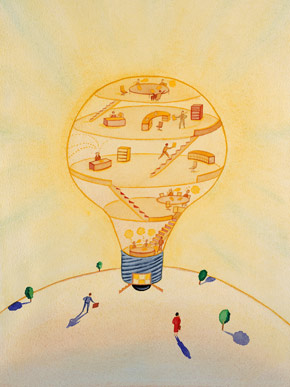Looking beyond the often stormy head-
lines of world economic news, Kiplinger analyses key industries, demographics and world markets, pulling together hundreds of strands to give managers and investors view of what lies ahead in the next two decades.
His vision is one of rapid and tumultuous change in global markets, the workplace and business structure.
It’s world of accelerating advances in telecommunications, biotech, new materials and energy.
It’s also world fraught with pitfalls for the unprepared — but rich in opportunities for those who see changes coming.
Knight Kiplinger is editor of the Kiplinger Letter, USA’s leading business forecasting publication and editor in chief of Kiplinger’s Personal Finance Magazine.
Higher growth, greater wealth
Not surprisingly, the growth and dispersal of technology is the major driving force of the boom.
But also important in this picture is the pattern of increasing government competence and world democracy, as well as growing new middle class and economic freedom.
“In the developing nations, the vast new global middle class will be both tough competitors and avid customers of the advanced nations.
“The boom will come about as people in the less developed nations become linked into the wired world, find work, and become consumers themselves. Today’s advanced nations will have competition from low wage workers in less developed nations, who will become consumers.”
Competition from less developed nations will drive the labour forces of the richest nations to upgrade their education and skills and stay one step ahead as they always have, he says.
Trends
* force for freedom: Repressive governments will find it impossible to block out progressive ideas and culture and to keep citizens from learning beyond their borders. “Instant global communication will help level playing fields of commerce, narrowing the gap between ignorance and knowledge.”
* Transnational growth: Multinationals now produce one fifth of global manufacturing, and will move into any power vacuum created by the waning ability of governments to control their economies.
* Further growth of virtual corporations:
Contract manufacturing from independent suppliers anywhere in the world will rise.
* Biological sciences: Will be the brightest stars. “The payoff from years of scientific research and investment in genetics is almost here — and it will change life, more than revolutions in telecommunications and computers.”
Kiplinger believes that enormous fortunes will be created by more entrepreneurs and financiers on every continent, than at anytime in history.
50 amazing years of change
Half century ago, who would have foreseen home PCs, Internet communication, mobiles, organ transplants, artificial hearts, invitro fertilisation, space research stations, 160mph trains, contraception pills, automated factories, cable TV, online stocks from your desk, and the ability to replicate any living thing.
Of course, some things haven’t changed; cars still run on the same fuel they have since the 1890s and homes are still built on site by workers, mostly from wood.
World’s most globalised business
Making computer components is already the world’s most globalised business, with multinational firms making chips, hard drives, monitors and other parts in dozens of nations.
Writing software code has also spread worldwide with software giants setting up programming operations in India, Ireland, Israel, Mexico, the Philippines, Russia and many other nations.
This trend will continue as companies experience shortages of computer engineers and programmers at home but are able to hire all they need, at lower salaries in other nations.
Superintelligence
* Knowbots: The new frontier in software will be intelligent agents that screen information and perform tasks for the user like robot. Examples already exist in the form of online financial information that you program to alert you to news about particular share or industry. Agents let your computer talk to someone else’s computer on your orders. Over the next few decades these agents, known as knowbots, programmable personal assistants, will take on number of tasks to think and act as you would. For instance, buy an airline ticket after you’ve told it where you want to go, and how much you’ll pay. Or arrange luncheon appointments by checking other people’s online calendars. Agents will also find items of interest in newspapers, shop for cars in certain price range and filter out unwanted phone calls using kind of super caller-ID.
• Virtual reality technology: will operate on Internet retail sites, for example when you buy tickets to sports game or theatre, you can sample the view of the field or stage from different seats.
• Housing: Telecommunications will start to be felt in the home with extras like phoning from your car or office, to tell your knowbot to turn up the heat or fill the bath.
• Shopping: Automated self checkout systems currently trialled in grocery stores will spread in the next decade. Like self- service petrol stations, you scan your own groceries and pay by credit card. While expensive to set up, it ultimately saves labour costs, enabling store owners to expand opening hours, and increase profits. This will spread to other stores.
Derailing the boom
There are some cautious notes: This could all be slowed or temporarily derailed by any of several calamitous setbacks of non economic nature — widespread war, devastating epidemics, nuclear or biological terrorism, paralysing global computer or telecom breakdown caused by either equipment failures or sabotage.
Cyber-sabotage
“Countries will take seriously the idea that terrorists could plunge whole continents into the dark, disable defense systems, shut down world financial trading, or plant viruses in major computer systems and prevent their normal operation for long stretches. The only possible defence, not necessarily foolproof — is constant changing of access codes, passwords and other locking devices.”










